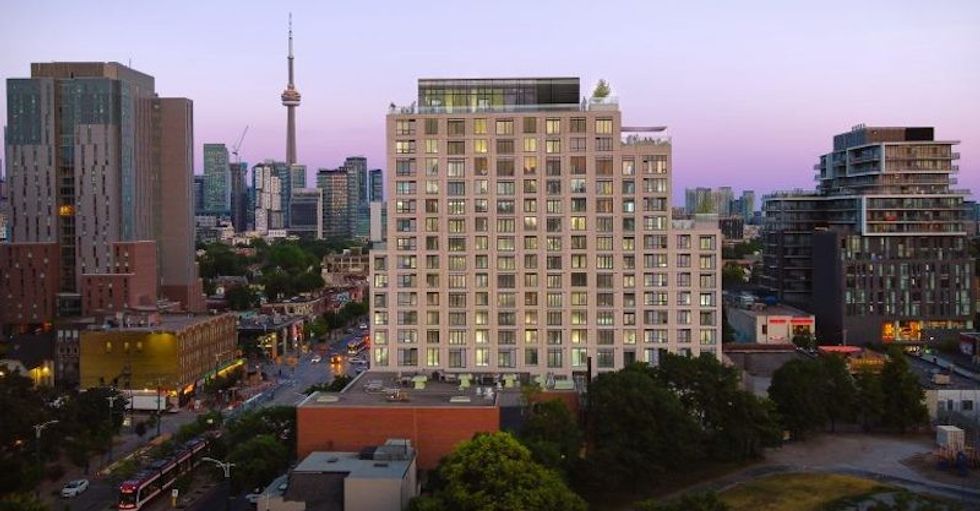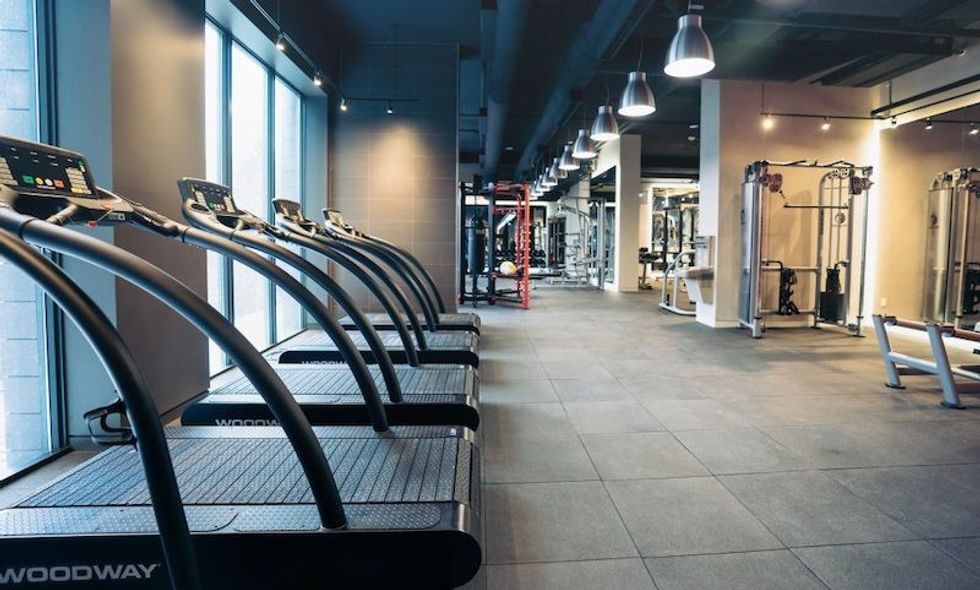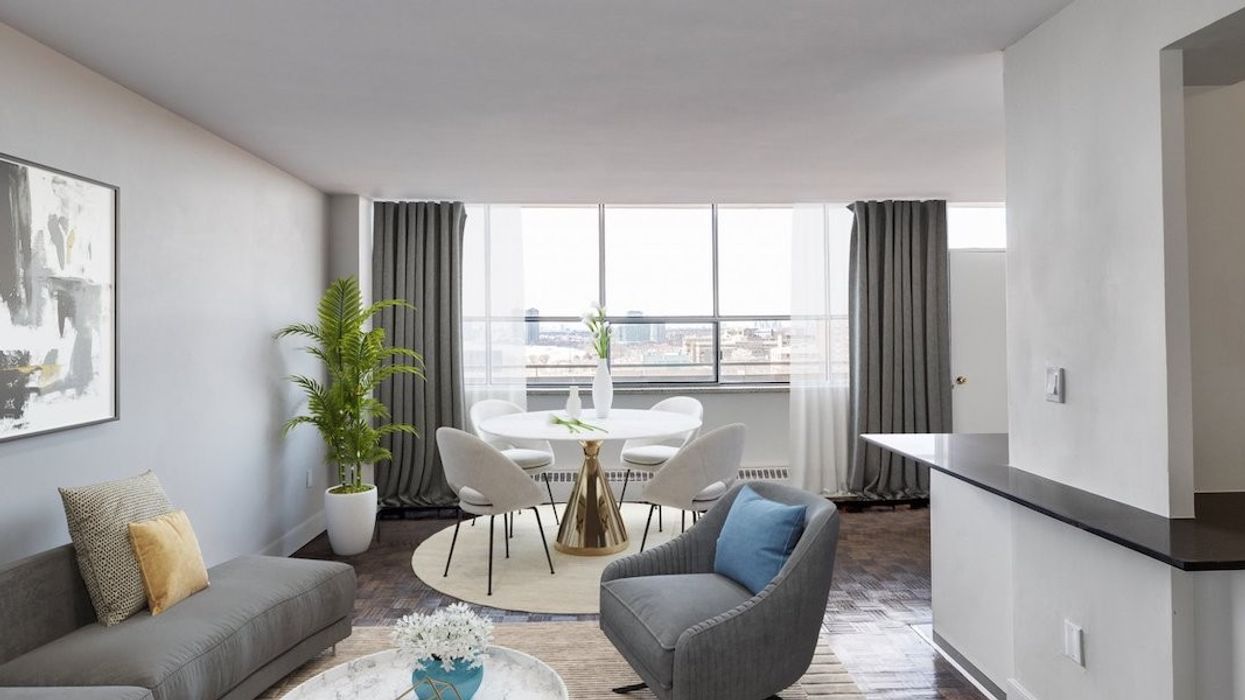Even before the COVID-19 pandemic, Adrian Rocca had been thinking about the health of his residents.
The CEO of Fitzrovia Real Estate knew the head of Cleveland Clinic Canada, who asked Rocca to check out its new technology for online health clinics. Earlier this fall, Fitzrovia announced a partnership with Cleveland Clinic to provide residents with on-site virtual health care.
“We’re always looking for ways to offer services to make our residents’ lives a lot more enjoyable and easier in our buildings,” Rocco says, “and we thought a health-care solution was an important one.”
The virtual clinic will debut at The Waverley, Fitzrovia’s first purpose-built rental building at Spadina and College in Toronto, to be completed in January 2021. Residents will have access to a designated, private space with diagnostic equipment on site and an iPad available to consult with a physician. The on-call doctor will be able to diagnose up to 120 (non-emergency) illnesses and, if necessary, write virtual prescriptions. All residents over the age of 2 can be assessed for a variety of medical concerns, including screening for COVID-19.
“So, you most likely will never have to go to a walk-in clinic again,” says Rocca.

INNOVATIVE AMENITIES/UNPRECEDENTED INCENTIVES
Access to virtual health care is just one of the more innovative amenities on offer in the GTA’s increasingly sluggish rental market. A seismic drop in average rents in Toronto – more than 17 per cent lower than a year ago – has led landlords and property managers in the city to offer unprecedented incentives.
It’s not unusual to see rental units available with one or even two months free rent, offers of free parking and move-in bonuses.
Coupled with higher vacancy rates, these lower average rents have put renters in a position of power, and have forced landlords to get creative, not only to attract prospective renters, but also to retain existing tenants.
READ: This is the Most Searched for Neighbourhood to Rent in the GTA
During the lockdown in the spring of this year, Greenrock Real Estate Advisors provided $1.5 million in resident support and community funding. As part of that funding, the property management company allocated $300 in grocery gift cards to each suite in its 2,000-suite portfolio – $100 for each suite in April, May and June.
This fall, during the second wave of the pandemic, Greenrock added a further $600,000 of resident support. All units in its portfolio will receive additional $100 grocery gift certificates in each of October, November, and December 2020
In a communication to residents, Greenrock CEO Gloria Mogavero stated, “As we reach out to help each other, if only in a small way, including all our residents in these measures is especially meaningful. It’s a time of separation, but we’ve never been closer.”
Apart from being goodwill gestures, amenities such as free groceries and virtual access to health care are effective tenant retention strategies. For his part, Rocca believes Fitzrovia’s partnership with Cleveland Clinic is also a winning tenant prospect strategy.
“I do think it’s a difference-maker,” he says. “We do a lot of focus groups when we roll out new services and new products, and the feedback on this partnership – even pre-COVID – was immense.”
While some property managers have introduced new pandemic-related incentives and services, virtually all have had to pivot their amenities.
With approximately 35,000 rental units in Canada and the United States, Tricon Residential is a rental housing company focused on high-growth residential markets across North America. In 2018, Tricon opened The Selby, a purpose-built rental apartment on Sherbourne just south of Bloor in Toronto, equipped with a state-of-the-art gym, spa, outdoor pool and onsite bistro housed within a heritage mansion that is part of the building.
“This is not the apartment building of yesteryear,” says Andrew Joyner, Tricon Residential’s managing director.

STAYING FIT THROUGH MOBILE DOORMAN
Yet during the pandemic, access to some of these amenities has been limited or prohibited altogether in adherence to public health guidelines. According to Joyner, to continue delivering a resident experience, Tricon has focused on technology.
Selby residents have access to an app called Mobile Doorman, allowing them to communicate directly with management, stay connected and book amenities after answering COVID-19 screening questions.
“In order to deliver a high-quality resident experience when amenities were closed, Tricon offered online virtual fitness classes, so residents could exercise within their suites,” says Joyner.
KEEPING RESIDENTS ENGAGED; BUILDING COMMUNITY
To further keep residents engaged, Tricon offered online cocktail mixology classes, hosted by one of the bartenders from the building’s bistro, and held virtual cooking class competitions with other buildings, judged by local chefs.
Greenwin Corp. has also moved its face-to-face resident experiences online. When the pandemic forced it to pause all in-person events, Greenwin launched “Suite Events,” which offers hours of free programming each week. Through a digital portal, residents can log on to watch children’s programming, take a yoga class or learn a craft.
“Resident programming has come a long way,” says Lucy Gouveia, Greenwin’s vice-president of marketing and leasing. “People are not just looking for a place to live anymore. It’s a sense of community and the service excellence that comes along with it that they’re looking for.”
She considers event programming a “value-add” that Greenwin, with 10,000 purpose-built rental units in Ontario and Quebec, is promoting on all its social media campaigns.
TRANSFORMING COMMON SPACES INTO CO-WORKING SPACES
Another value-add in our work-from-home era is access to a co-working space.
“Work-from-home concepts and co-working spaces are very much flavour-of-the-month right now,” says Fitzrovia’s Rocca. “So, what does that mean? It’s dedicated printers, access to office supplies, having full computer screens people can just tap into with their laptops, keyboards available, things like that.”
The Selby has ample space for contained common areas for work or pleasure. One of its common areas, which includes a full kitchen and lounge, is equipped with divider walls, allowing the space to be segregated into three distinct areas. Similar space dividers are available on the outdoor patio. The divider walls were a pre-COVID design decision, “but it has proven to be a good one in terms of resident comfort and control of their circle,” says Joyner.
That level of design flexibility, coupled with technology, is likely the way forward in attracting tenants in a post-pandemic market.
Jonathan King, principal at architectural firm BNKC, believes the pandemic has led designers and residents alike to rethink what they want from a residence in the future.
“There appears to be a reprioritization of some of the elements that typically go into the design of a project,” he says. “People are revisiting what’s important to them in design – and they’re trying to crystal-ball what needs to be in place. But it’s also in the spirit of creating future flexibility and future-proofing the design overall.”
King, BNKC’s partner in charge and lead on all its multi-residential projects across the GTHA and Peterborough, says a big part of future-proofing design is technology. He points to touchless tech and integrating systems between units and the building at large. “As an example, there’s technology out there that allows a system to anticipate when you need to get to an elevator,” he says. “So, when you leave and start to lock the front door of your apartment remotely, it automatically calls the elevator.”
Besides the bells and whistles of future tech and modular design decisions, King echoes what many landlords and tenants are looking for in a residential apartment building: “You want to create a sense of community,” he says. “If you can create that sense of community – that’s the hallmark of a successful rental apartment building.”
Therein lies the challenge for property managers in a softening market: offering an affordable, leading-edge product that keeps renters safe and distanced from one another, while engaging them in a community.
A FEW OTHER IDEAS FOR POST COVID-19 AMENITIES
It’s a renter’s market. What else could landlords do to make their properties more attractive to prospective tenants? The team at Rentals.ca has some ideas.
Work-from-home solutions:
- Free, fast, secure internet for an initial period
- A free, ergonomic office desk and/or chair
- Co-working spaces; common printers/scanners; have clear, vertical screens to separate workers
- Built-in nooks for office space; play spaces for kids
Health/Safety solutions:
- Contactless doors, from entering the building to elevator to unit
- Free sets of dumbbells and yoga mats
- Contactless shipping container, area for building to receive packages
- HEPA filters for units/buildings
Family/Social solutions:
- Free plants: options to grow plants, herbs, flowers inside or outside
- Partially furnished units
- Safe ways to host guests – clear plexiglass screens that can attach to your dining room table (as seen at bars, restaurants and grocery stores)
- Dimmers on lights
A RANDOM SAMPLING OF MOVE-IN INCENTIVES LISTED ON RENTALS.CA IN TORONTO
https://rentals.ca/toronto/600-kingston-road-1 - 2 month’s free
https://rentals.ca/toronto/368-eglinton-avenue-east - $500 move-in bonus
https://rentals.ca/toronto/rosewell-gardens-apartments - Move in now, and don’t pay rent until 2021
https://rentals.ca/toronto/77-roehampton-avenue - 1 month free and $200 Visa gift card
https://rentals.ca/toronto/18-erskine-avenue - 2 month’s free rent +1,000 bonus for 1 bedroom or 1 + den
This article originally appeared on rentals.ca and was written by Sarah Moore.






















